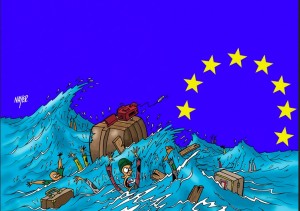The European Union is once again struggling to come up with a coherent asylum strategy for its 28 members. In recent years, the rising number of asylum seekers entering the European Union through countries such as Italy and Greece has generated friction among member states, fueled criticism of the Schengen Agreement and contributed to the growing popularity of nationalist parties.
However, the European Union will not reform its asylum policies in any significant way. Member states will provide more financial assistance to Mediterranean countries, but they will refuse to accept quotas of immigrants over the coming months and years. Anti-immigration sentiments will persist across the Continent, putting substantial pressure on one of the European Union’s founding principles: the free movement of people.
On April 23, the European Union submitted to pressure from Italy and Malta and held an emergency summit to address the immigration crisis in the Mediterranean. Between January and April, more than 1,750 migrants died in shipwrecks at sea, a death toll 30 times higher than that of the same period in 2014. Over the past year and a half, Italian ships have rescued more than 200,000 people in the Mediterranean Sea.
After the summit concluded, EU leaders decided to triple the financial resources for the bloc’s operations in the Mediterranean Sea and to boost cooperation with certain countries like Tunisia, Egypt, Sudan, Mali and Niger to better control borders and combat human trafficking. They also asked EU Foreign Affairs Chief Federica Mogherini to begin preparing for a possible military operation aimed at identifying, capturing and destroying vessels before traffickers could use them. However, the bloc’s leaders did not reach any agreements on the distribution of asylum seekers across the Continent. Moreover, many of the goals discussed during the summit will prove difficult to achieve. EU Immigration

